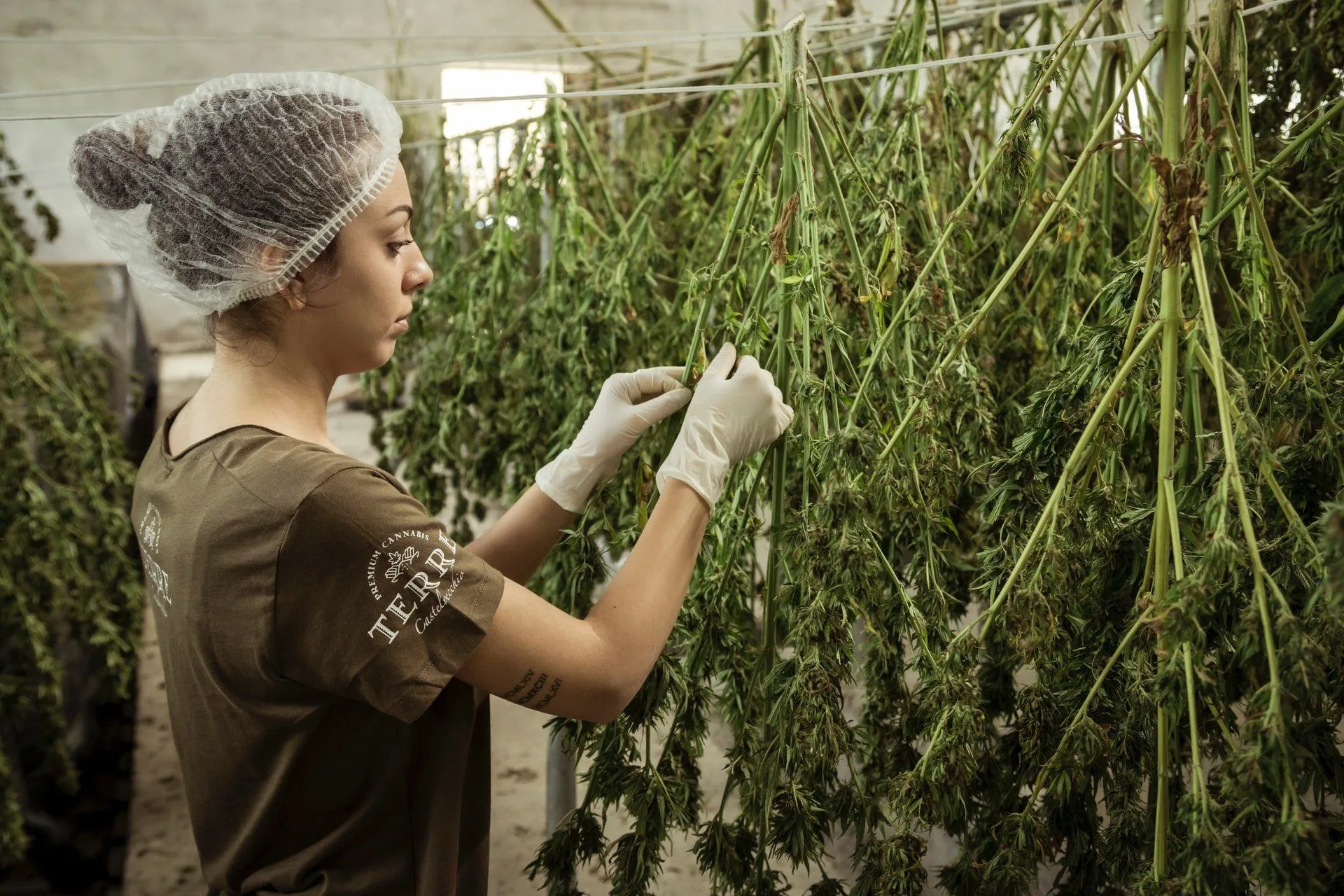If you ever wondered what the aromatic components that create natural scents such as lavender, orange, lemon, rosemary, and pine are called, they are terpenes, and they are all-natural.
The benefits of terpenes have been widely regarded, and they have been enjoyed for centuries now. But modern-day researchers are continuously uncovering their therapeutic effects through ongoing clinical trials. The minimal finding is promising toward a future for flower terpene treatment.

Photo by Shane Rounce on Unsplash
What Exactly Are Terpenes, And Why Should You Care?
Scientifically, terpenes are classified as large classes of organic (hydrocarbon) compounds formulated from five-carbon isoprene units.
They are combined to produce a great variety of skeletons, according to Elaine M Aldred, BSc.
Petrina Kapewangolo from the University of Namibia added that they are considered one of nature’s most varied structural compounds and display various biological and pharmacological activities, including strong antioxidant properties. Terpenes are largely found as constituents of essential oils as well.
What Do Terpenes Do, And How Do They Affect The Body?
Playing a crucial role in nature and especially in plants, terpenes are responsible for attracting pollinators and repelling predators. In addition, they are found to strengthen plants’ immune systems, keeping them healthy by warding off infectious microorganisms. Terpenes are also responsible for a plant’s oxygenation and regeneration.
In the same manner, terpenes affect the body as many of them are technically active. Therefore, it is assumed that the higher the concentration of terpenes, the greater their impact on the human body.
Most terpenes are associated with their calming and therapeutic effects. Even with limited studies, people argue that terpenes have an antioxidant effect, boosting the flower effects and giving an extra high known as the “entourage effect.”
How Are Terpenes Used?
Being incredibly aromatic, terpene-based solutions or products are used by many for aromatherapy or stress relief in the form of a candle, an essential oil, or an aerosol.

Photo by Esteban Lopez on Unsplash
Terpenes are also extrapolated from plants to be used as scents and constituents of fragrances mixed in cosmetic products such as body lotions, perfumes, and food products. Additionally, terpenes are used to augment the effect of the flower.
Prominent Terpenes
There exist more than 20,000 terpenes. While hundreds of various terpenes have been found in flowers, only a few appear more commonly and in greater concentrations. The following are some of the most common terpenes and their benefits.
-
Limonene
More commonly found in citrus fruits in which it provides a distinct citrus smell, limonene is used in a variety of natural products like fragrances and cleaning agents. Limonene is also reported to boost one’s immune system, relieve symptoms of heartburn, and even use it as a solvent to melt gallstones that are made up of cholesterol.
-
Linalool
Found in lavender, jasmine, rose, rosewood, bergamot, and coriander, linalool carries a pleasant floral aroma and is often used in perfumes and soaps.
It potentially reduces inflammation and inflammatory pain like other terpenes and has other unique health benefits such as inhibition of fungal infection growth outside the human body, mainly as they arise from the yeast infection candida. Linalool was also found to have sedative and anticonvulsant properties.
-
Myrcene
One of the two most prominent flower terpenes, myrcene carries the signature earthy aroma found in most flowers. Just like other terpenes, myrcene shows potency as an effective anti-inflammatory. It is also reported that it alleviates pain and may be helpful for osteoarthritis.
-
Caryophyllene
Another terpene found in flowers, caryophyllene, is also extracted from hops, rosemary, and cloves, carrying an herbal aroma similar to these plants. Myrcene and caryophyllene have both anti-inflammatory and pain-relieving properties, as found in animal models.
-
Pinene
One of the most commonly expressed terpenes in all of nature, pinene is popularly found in pine trees and other conifers, responsible for that piney aroma of certain flower cultivars. Pinene is known to have anti-inflammatory, as well, and helps improve airflow to the lungs and protects from ulcers.
-
Terpinolene
Boasting a fresh herbal-citrus aroma, terpinolene is chiefly found in plants known for pleasant fragrances, such as rosemary, conifers, lilacs, and apples. Experimentations have identified terpinolenes as a potential antioxidant. In animals, terpinolene has been found to contain sedative properties. The terpene can be potentially used to decrease cell proliferation associated with cancer.
-
Humulene
Also predominant in hops, humulene is present in sage, black pepper, clove, ginseng, and basil, carrying a corresponding hoppy scent. Studies have shown that it may be a potent topical pain reliever and anti-inflammatory.
-
Bisabolol
With a mild floral scent, bisabolol is frequently incorporated in cosmetics and fragrances. It is believed to have properties that heal the skin. Studies in animals have demonstrated that bisabolol reduces skin inflammation.
6 Potential Medical Benefits Of Terpenes

Photo by Roberto Valdivia on Unsplash
1. Antibacterial and Antifungal
A number of clinical trials have proven that many types of terpenes demonstrate antibacterial, antifungal, and antimicrobial properties.
Sixteen terpenes—namely thymol, eugenol, carveol, terpineol, and limonene—were found to have antibacterial properties. Eugenol was among the two terpenes that were most potent at inhibiting bacterial growth.
Six out of the sixteen were also discovered to have bactericidal properties. This means that the compounds actively decreased the bacterial population, as opposed to just slowing bacterial growth.
Additionally, the study found that eugenol and terpineol had potent effects against salmonella and S. aureus. In the same vein, carveol turned out to be highly effective against E. coli at higher dosages. This concludes that certain terpenes can treat food-related medical conditions, like food poisoning and typhoid.
Other terpenes are also capable of affecting the cell membrane of parasites, causing lysis. Limonene, for one, is effective against parasites. It targets the parasite’s active isoprenoid pathway, significantly damaging the biological processes. Terpenes that are known to be effective against bacteria, fungi, and microorganisms include the following: limonene, eugenol, terpineol, and carveol.
2. Antiviral
Several studies have tried the potency of terpenes against viral infections in humans. One of the studies found that terpenes have been virucidal against three major human viruses, namely dengue virus type 2, herpes simplex virus-1 (HSV1), and Junín virus. It shows that the compounds have actively reduced the occurrence of the virus within the body.
Another study discovered that some plant-based essential oils produce antiviral effects on severe acute respiratory syndrome coronavirus (SARS-CoV) and HSV1. Such oils contain a variety of terpenes, such as alpha and beta-pinene, as major components. These terpenes are also known to have antiviral properties: carvone, limonene, alpha- and beta-pinene, and caryophyllene.

Photo by Terre di Cannabis on Unsplash
3. Anti-inflammatory
Certain terpenes demonstrate anti-inflammatory capabilities, particularly reducing the number of signaling chemicals immune cells secrete. These excess amounts of signaling chemicals result in unnecessary inflammation in the body and may even lead to cell death.
The examined terpenes also appear to have characteristics that inhibit pain, like mitigating tenderness in swollen areas. In an experiment of terpenoid-rich essential oils, those terpenes were observed to be highly effective at relieving pain both in-vitro and in-vivo trials. The study indicates that such compounds can be used to treat acute instead of chronic inflammation.
Terpenes found to have anti-inflammatory effects include the following: limonene, myrcene, linalool, and caryophyllene.
4. Anti-diabetic
Apart from controlling bacterial growth, another observed quality of some terpenes is their effects on diabetes patients.
Andrographolide is most notably a terpene component of the leaves of A. pandiculation, which can cause a decrease in blood plasma glucose and increase glucose use by activating the receptors that control these functions. At the same time, the compound helps prevent the onset of diabetic retinopathy—one of the complications of diabetes. This happens because of the terpene’s anti-inflammatory effect.
Curcumin, another terpene, reduces inflammation and activates essential liver enzymes responsible for creating glucose, breaking glucose down, and lipid metabolism. Curcumin also reduces the effect of other diabetes-related complications such as retinopathy, microangiopathy, neuropathy, and nephropathy.
The best terpenes with anti-diabetic effects include the following: andrographolide and curcumin.
5. Anti-cancer
When it comes to cancer treatment research, terpenes have a reputation for their anti-cancer properties, too. They prevent cancer cell proliferation by apoptosis, interrupting the cell cycle. These chemical reactions often differ, though, depending on the signaling chemicals or targeted receptors.
As much as there are different administrations of terpenes across studies, they have been found to be effective against various types of cancer, including cancers of the skin, breast, lungs, bone, prostate, brain, and colon.
Investigations into specific mechanics continue, and limonene has been discovered to have strong cancer inhibition activity. Meanwhile, thymoquinone has also been tested to be effective against several other cancers. These other terpenes are also found to have cytotoxic effects, making them a promising component for cancer treatments: alloocimene and pinene.

Photo by GreenForce Staffing on Unsplash
6. Antidepressant
Apart from physiological health benefits, terpenes also work wonders for mental health. For example, studies show that terpenes are becoming a viable option for managing depression.
Based on research, beta-pinene and linalool interact with pathway receptors for adrenaline and serotonin. In addition, beta-pinene activates dopamine receptors, which is consistent with how most over-the-counter antidepressants work. In addition, beta-caryophyllene curbs depression by interacting with the CB2 receptor in the brain, which is critical in regulating depressive-related disorders.
Hyperforin is another terpene that has effective antidepressant properties. Similar to antidepressants, it works by impeding the brain’s uptake of mood regulators such as serotonin, dopamine, and norepinephrine. However, this compound has its own unique mechanism for controlling depression by inhibiting the neurotransmitters’ uptake of certain chemicals.
Terpenes Make Great Contributions To Wellness
Even though more thorough studies are needed to fully discover all the advantages of terpenes, current research already clearly shows that terpenes are naturally beneficial to health. It is best to stay safe if you plan to buy terpene products or make your own mixtures. Always consult with your physician first and purchase from verified and authentic manufacturers for the safest and best results.
Additionally, this should go without saying, but terpenes can only do so much for wellness. Even if they are highly beneficial, it is still necessary for you to take care of yourself every day. You can do that by exercising or doing other physical activities, eating healthy, maintaining a work-life balance, regularly going to medical check-ups, and so much more.
*These statements have not been evaluated by the Food and Drug Administration.
Main photo credit: Photo by Tracey Hocking on Unsplash
Endnotes
Elaine M Aldred BSc (Hons), DC, Lic Ac, Dip Herb Med, Dip CHM, “Chapter 22 – Terpenes,”
2 Petrina Kapewangolo “Chapter 13 – Plectranthus barbatus; Antioxidant, and Other Inhibitory Responses Against HIV/AIDS,”
3 BOOMTOWN DEVS “WHAT ARE TERPENES AND WHY SHOULD WE CARE?”



![women [longevity live]](https://longevitylive.com/wp-content/uploads/2020/01/photo-of-women-walking-down-the-street-1116984-100x100.jpg)










